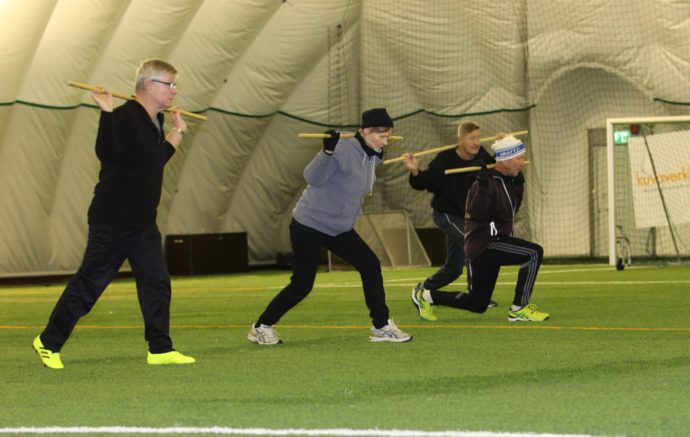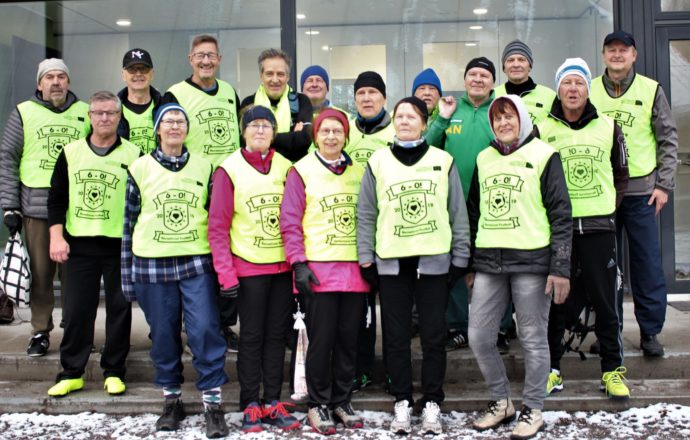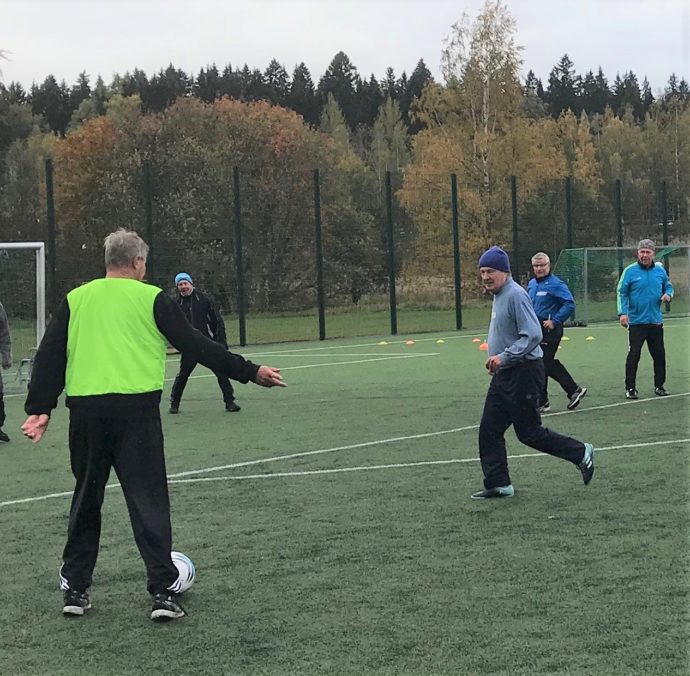Laurea´s Learning by Developing (LbD) model emphasises learning actions in projects, which are connected to real–life situations. The resulting outcomes are individual learning, community learning and produced innovations. Erasmus + Sport funded five nations´ 6-0! project engage students, work life and citizens 60+ years to support individual´s health, wellbeing and social cohesion by playing recreational football.
Football is medicine
Physical inactivity is the fourth leading risk factor for global mortality. Physical inactivity levels are rising in many countries with major implications for the prevalence of noncommunicable diseases (NCDs). (WHO 2010) Human ageing is characterized by a progressive decline in physical and physiological function, which also is a major risk factor for most non-communicable diseases. Thus, preventive strategies are needed. As physical activity levels are generally decreasing with aging, physical activity is an effective and low-cost approach to counter most age-related conditions with minimal risks or side effects. (Luo et al. 2018)
 Photo. Pirjo Valpas
Photo. Pirjo Valpas
Recreational football may be described as an all-in-one type of training with broad-spectrum fitness effects for the general population. Comprised of small-sided games with thorough warm-up, football training for 2×1 hour per week is shown to result in marked positive and simultaneous effects on cardiovascular, metabolic and musculoskeletal fitness. (Krustrup & Krustrup 2018)
Recreational football protocol is put into practice in Laurea coordinated 6-0! project for persons 60+ years. The Erasmus+ Sport funded project aims is to enhance health, physical and social activity by recreational football in five partner countries (Finland, Denmark, France, Spain and UK).
Planning 6-0! project
Over 150 peer-reviewed research studies on recreational football health benefits in all age groups woke up the interest for this project. Surprisingly, ball games, as a form of physical activity, are not often offered to the senior citizens. Erasmus+ Sport funding enabled to start the 6-0! project and it was clear from the beginning that LbD action model would play a great role in the project.
The stages of the LbD action model are planning, acting, evaluation and developing (Raij 2018, 14). Writing the proposal started the project planning. Kick-off meeting with the partners and representatives from work life; Espoo city Sports and Recreation department, local football club Leppävaaran Pallo and a representative from the Finnish Football Association drew the lines for the 6-0! actions to come.
The 6-0! project partners planned pre- and post-measurements as well as the general guidelines for 12 weeks of training. It was clear for all the partners, that students will be engaged to the activities. Students were planned to carry out the project measurements, guiding the football activities on training sessions and to aid with the data analysis. All this happened through study courses or by a thesis work.
In Finland, local football club, Leppävaaran Pallo, provided the training facilities and one coach. Participants were mostly recruited by a local newspaper article. In Finland, the youngest player was 60 years whilst the oldest player was 75 years of age.
6-0! football actions
 Photo: Pirjo Valpas
Photo: Pirjo Valpas
26 players (10 women, 16 men) were recruited for the playing group in Finland. 12 persons were recruited to come only for the measurements and serve as a control group. The training group was very heterogenic, some participants had previous experience of football and some players were total novice. Prior each training session a coffee moment was held on a clubhouse to highlight the importance of project´s social aspects. 12 weeks of training, 2×1 hour per week, were conducted in each partner country.
Training went well. The adherence rate of the participants was high. Some minor muscle problems were faced, with one unfortunate wrist fracture by a normal fall. During the sessions, all the participants were physically highly active. Best of all, satisfaction among the participants was very high. Social interaction between players has been important and source of motivation to many participants.
6-0! measurements and training sessions were mostly mastered by the students with guidance of teachers. Students involved in the training sessions had many experiences and surprises of how capable the participants physically were.
Evaluation of 6-0! project actions
The two year 6-0! project is over half way by the time of publication of this article. The evaluation of the results will happen during the coming months starting with partner workshop meeting. By now, it is clear that the project has been successful in many ways.
Partly encouraged by 6-0! project Espoo city has added three ball sport sessions for senior citizens along the weekly offered nearly 200 guided sport activities. Local football club, Leppävaaran Pallo, is planning to continue 6-0! activity in the future. As the project activities will be over on April 2020, Espoo will continue the recreational football training to the end of spring 2020.
 Photo: Pirjo Valpas
Photo: Pirjo Valpas
6-0! participant´s physical and mental fitness has been increasing during the time. Luo et al. (2018) stated that recreational football appears to be safe for older adults and 12 weeks training results in significant positive adaptations in cardiorespiratory capacity, body composition, lower limb muscle function and strength in untrained, healthy and unhealthy older adults. This can be confirmed at least by 6-0! Finnish project activities.
Disseminating 6-0! project results
One of the aims of the 6-0! project is to produce a practical guide, guidelines, for local teams, communities and others of interest, to arrange recreational football activities for the aging adults. Already by now, there has been number of activities with the Finnish Football Association to disseminate project results to the grassroot level actors in various events.
Polar Electro, world known heart rate monitoring specialized company, has been lending their Polar Team Pro system to Finnish 6-0! project. Polar Team Pro system is designed especially for professional sports, but 6-0! project will provide data of older adults recreational football activities. It is assumed, that these results can be obtained for company dissemination activities. Smartifier, Finnish SME company, provided smart balance boards, “Standout”, for the project balance measurements in each of the participant country. 6-0! project will provide valuable information for the company to develop their product further.
6-0! project will produce a large amount of different level data. The aim of the 6-0! is to go more public, as collected data will be analyzed. Thesis works will play a role on project dissemination. Meanwhile www.6-0.eu webpages and @6_0football Twitter account will serve the main source of information of the 6-0! project.
6-0! project and LbD
Learning by Developing model is challenging the traditional way of teaching and acting. It requires more cooperation between the actors of different fields and presupposes that a student is an equal partner in learning and RDI processes. (Raij 2018, 14) Low threshold funded projects, e.g. Erasmus+ Sport, are excellent projects to support and proceed LbD model actions in daily studies in Laurea.
Even in the half way of the project, 6-0! seems to be a fine example of LbD action model possibilities in the RDI projects. Many stakeholders – students, teachers, Espoo city, third sector actors, private companies and especially end-users, the 60+ players, have been benefiting and learning from the 6-0! project. With the words of one participant “No one believed me, when I told that I start to play football”, describes the hidden capacities of many of us. We just need to be curious, need to explore and exploit the possibilities of individual will and capacity. Recreational football for senior citizens is a valid tool for increasing physical activity level.
References
- Krustrup, P. & Krustrup, B.R. 2018. Football is medicine: it is time for patients to play! Br J Sports Med 52 (22), 1412-1414.
- Luo, H., Newton, R.U., Ma’ayah, F., et al. 2018. Recreational soccer as sport medicine for middle-aged and older adults: a systematic review. BMJ Open Sport Exerc Med Aug 9;4(1):e000336.
- Milanović, Z., Pantelić, S., Čović, N. et al. 2019. Broad-spectrum physical fitness benefits of recreational football: a systematic review and meta-analysis. Br J Sports Med 53 (15), 926-939.
- Raij, K. 2018. Summarising the Basis of LbD for Further Development – Review. In book: Juvonen, S., Marjanen, P., Meristö, T. (eds.). Learning by Developing 2.0 – Case studies in theory and practice, 16-27. Laurea Publications 101.
- WHO 2010. Global recommendations on physical activity for health. Geneva, Switzerland.